Research staff, lawyers and expert managers involved in university TBFs and KBEs met this Tuesday at the PCUV to analyze the role of these organizations as levers of innovation in an event framed in the Globaltech program, which promotes the FPCUV with the support of the Conselleria de Educación Universidades y Ocupación to promote businesses and projects in the Valencian innovative ecosystem, emphasizing its global approach
The IV Conference on public-private collaboration in the field of research and innovation, which was held on November 14 at the Marie Curie Auditorium of the University of Valencia Science Park (PCUV), brought together researchers, lawyers and experts from university TBFs and KBEs to analyze the importance of these types of companies as levers of innovation in the Valencian Region. The event, in which the GI+DPI, the University of Valencia and the Conselleria de Educación Universidades y Ocupación collaborate, is framed within the Globaltech program, which promotes businesses and projects in the Valencian innovative ecosystem, emphasizing its global approach.
One of the ways in which public-private collaboration can be materialized in the field of research and innovation is through the creation of Technology Based Companies (TBCs). Therefore, this conference aimed to provide an overview of the various issues that arise in the process of establishment and subsequent development of these TBFs, especially those that have their origin in the research conducted at universities, this being one of the ways to articulate the transfer and exploitation of research results and to promote collaborative innovation.
In this line, Rosa Donat, Vice-Rector for Innovation and Transfer of the University of Valencia gave a welcome speech in which she stressed that "the generation of technology-based companies and knowledge-based companies are really one of the priorities" of her Vice-Rectorate. She added that these types of organizations "must be a mainstay in the new university of the 21st century, where the knowledge that is developed from these companies returns to the University of Valencia to generate new companies". Thus, Donat stressed that the conference aimed to "help our researchers and encourage them to generate this transfer of knowledge that the University can provide and that society demands and needs".
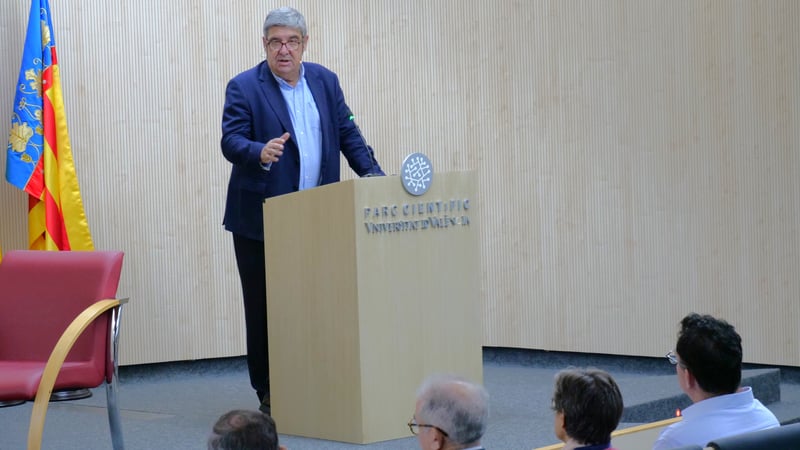 Jesús Olavarría, professor of Commercial Law at the UV, during the opening of the IV Jornadas Globaltech. Photo: FPCUV
Jesús Olavarría, professor of Commercial Law at the UV, during the opening of the IV Jornadas Globaltech. Photo: FPCUV
In welcoming the day, Jesús Olavarría, Professor of Commercial Law at the University of Valencia, pointed out that during the first "conversation", they would analyze how, through ETBs, "it is a question of passing the results of research to society in general, for the welfare of people. These results have not yet been tested in the market and that adds special difficulties". He also added that "the legal system often poses many obstacles", and he also warned that "we have 21st century companies, but with legislation that is very gradually adapting to the needs".
On the other hand, in the second "conversation", which would take place with jurists on problems of this legal system, he explained that at first "they can be frightening", since "technicians and scientists are normally refractory to the law, but these are the problems that arise when companies are created". "These problems slow down the creation and development of these companies, so they are the problems that researchers are going to suffer, and in some way we try to solve them little by little", he concluded.
Discussions with researchers and managers involved in university TBFs / KBEs
Technology-Based Firms (TBFs) are organizations that base their activity on applications of new scientific or technological discoveries for the generation of new products, processes or services. On the other hand, Knowledge-Based Companies (KBEs) are business initiatives whose activity is based on results derived from research activity carried out at the university level. These two types of companies were the epicenter of a "conversation", in which all the speakers added their point of view from their perspective.
Thus, Pilar Domingo Calap, Ramón y Cajal researcher at the UV and founding partner of the company Evolving Therapeutics, pointed out that not long ago "it was unfeasible" to develop the therapies in which they woFrk from the university, "because public investment in projects allows us to study basic science very well, to understand how to generate a product, but it was impossible to make a final product". Domingo Calap also emphasized the importance of "incubators" and the Parc Científic, and explained that "we entered AgrotecUV with a project idea that we did not know if it had a future or not, because we are researchers", and a few months after starting the initiative she added that "now I feel entrepreneurial, I feel that I do marketing, that I do commercial, that I do legal things. We have to learn a lot of things, maybe too late.
"Now UVemprén is doing a lot from within for young people, and the fact of being able to know that since you start university there is a way to transfer knowledge through a Spin-off, so anyone who has ideas can get to that. I think it is important for young people to be able to start doing these things, and this type of initiative encourages reaching out to society, since that is what science is all about, finding a solution to day-to-day problems", said the founding partner of Evolving Therapeutics.
In this line, Antonio Ferrer Montiel, director IDiBE-UMH; founding partner and president of Antalgenics, Hawk Biosystems and Prospera Biotech, explained that "the first TBFs we created was when this term was absolutely unknown in Spain, specifically in 1999, when the Law of Science was not in place and civil servants could not create companies, since if we had more than 10% we were in an absolute illegality, and that conditioned". On the other hand, Ferrer warned of the problems that existed in the relationship between the business world and the researcher, and he blamed it on a problem of "language", since "the language of scientists is not the same as that of businessmen, so years ago when we met, one spoke in Spanish and the other in Japanese. What one wanted, the other did not understand, so there was no way to transfer absolutely nothing".
"The language of scientists is not the same as that of businessmen, so years ago when we met, one spoke in Spanish and the other in Japanese. What one wanted, the other didn't understand, so there was no way to transfer absolutely nothing", Antonio Ferrer Montiel. Director IDiBE-UMH; founding partner and president of Antalgenics, Hawk Biosystems and Prospera Biotech
"I think this has changed because we have been allowed to incorporate innovation agents into the institutes and universities. These figures, like the UCIES, have a role to play in understanding entrepreneurs and transmitting the message on the one hand. I believe that the TBFs can play this role in an extraordinary way", concluded Ferrer.
Iker Marcaide Marchite, founder and president of the Zubi Group and the Zubi Capital fund, emphasized that when participating in the generation of spin-offs, the way his company is structured responds to the need to "make it easy for the researcher", establishing a relationship of "fellow travelers, allowing people to do what they are going to shine in". "In the end, if the mission of the universities is to give value to the knowledge developed for society, I believe that it also implies that it must be developed from all kinds of angles, including the channel of how to take this to the market through companies as a complementary channel to others that may exist in the university," said Marcaide.
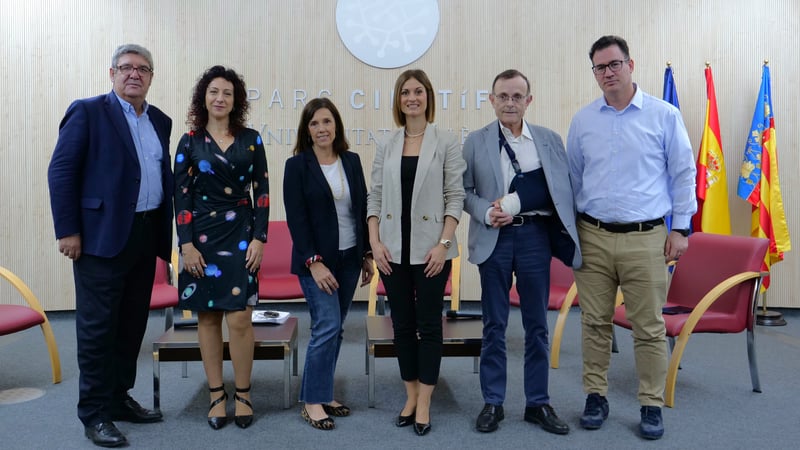
(From left to right) Jesús Olavarría, professor of Commercial Law at the University of Valencia; Inmaculada Montoya Castilla, professor at the UV and promoter of the company Emotic; Lucia Echevarría Gil, vice manager of Research, Transfer and Innovation UV; Pilar Domingo Calap, Ramón y Cajal researcher at the UV and founding partner of the company Evolving Therapeutics; Antonio Ferrer Montiel, director of IDiBE-UMH; founding partner and president of Antalgenics, Hawk Biosystems and Prospera Biotech; Iker Marcaide Marchite, founder and president of the Zubi Group and the Zubi capital fund. Photo: FPCUV
"We start from two different worlds, the university world and the business world, with very different languages. So for me, the difficulty we may have initially in being able to communicate or reach a final goal, because when we have a research result, for researchers it is one thing and for the company it is something completely different," said Inmaculada Montoya Castilla, professor at the UV and promoter of the company Emotic, who added that in an EBT it is essential to know in which "part in each one can obtain success or what is what they are best at to achieve a sense". "Despite the difficulty, things are changing, and we are finding a common sense and a way to communicate, because in the end we all have the need or desire for this to revert in society, in the benefit of people and in the promotion of health," Montoya closed his speech.
From her point of view, Lucia Echevarría Gil, vice-president of Research, Transfer and Innovation UV, highlighted that "there has been a very important evolution of the university. With the fantastic ideas that the people who work there have, it is the responsibility of a public institution to do everything possible to support these ideas in different ways", although she pointed out that currently "there are many difficulties with regulations that constrain the development of these initiatives in public institutions, but little by little with the help of legislative changes, which sometimes take a long time to arrive and it is not easy to implement them, and with the change within the university itself, within the people who make it up, initiatives are being supported that ultimately in these initiatives the importance of these companies can be seen".
"Despite the difficulty, things are changing, and we are finding a common sense and a way to communicate, because in the end we all have the need or desire for this to revert to society, to benefit people and promote health," Inmaculada Montoya Castilla, UV professor and promoter of the company Emotic
Case study discussions
As for the legal basis of TBFs and KBEs, there are a multitude of rules and laws that regulate them, which is why there is a need for entrepreneurs who start up their companies to have a perfect knowledge of this field, which jurists such as Marta García Mandaloniz, Assistant Vice-Rector for Guidance and Professor of Commercial Law UC3M, who emphasized "the historical starting point", the Organic Law of University Reform of 1983, when she explained that "research contracts between the university and the company were allowed, but just a year later the Law of Incompatibilities was passed, which placed limitations on the participation of faculty or research personnel in TBEs". "Two decades had to pass before a turning point was reached, and for me, it is not the Organic Law on Universities, but the Law for the Modification of the Organic Law on Universities, because it was the one that allowed, through the 24th additional provision, the possibility of research personnel being able to participate in companies to be extended," added García Mandaloniz.
Thus, according to the professor of Commercial Law UC3M, "the ground was fertilized to plant new seeds of university entrepreneurship, and I believe that it was the Science Law, first, and then the Science Reform Law. They were a point followed in that university entrepreneurship encouraged by the legislation". "I think that there have been conditions or contradictions between the Law of Organic Modification of Universities and the Science Law, but despite that, I think that a step forward was taken to promote university entrepreneurship, and I hope that the new modification of the Science Law and the incompatibility with the LOSU I think it can be a theoretical advance, then we will see if it is also practical," she concluded.
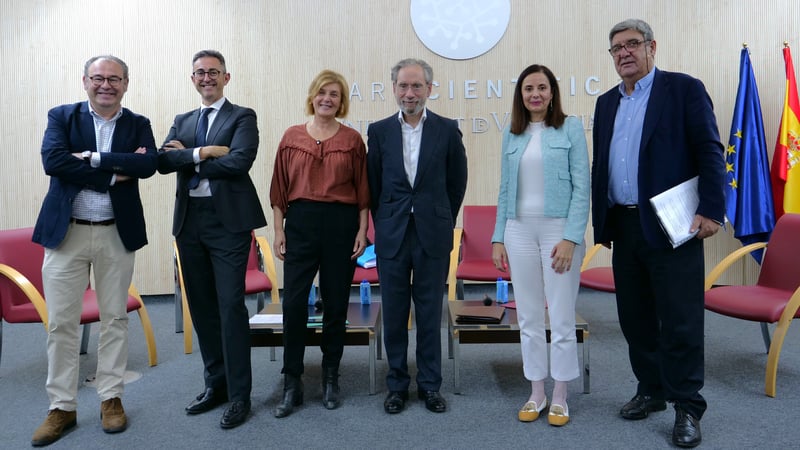 (From left to right) Guillermo Palao Moreno, Professor of International Private Law UV; Jaume Martí Miravall, Professor of Commercial Law and accredited to Professor of the UV; Eva Alcaraz, head of the Globaltech program and head of the legal area of the FPCUV; José Massaguer Fuentes, Professor of Commercial Law UMU; Marta García Mandaloniz, Deputy Vice Chancellor of Guidance and Professor of Commercial Law UC3M; Jesús Olavarría, Professor of Commercial Law at the University of Valencia. Photo: FPCUV
(From left to right) Guillermo Palao Moreno, Professor of International Private Law UV; Jaume Martí Miravall, Professor of Commercial Law and accredited to Professor of the UV; Eva Alcaraz, head of the Globaltech program and head of the legal area of the FPCUV; José Massaguer Fuentes, Professor of Commercial Law UMU; Marta García Mandaloniz, Deputy Vice Chancellor of Guidance and Professor of Commercial Law UC3M; Jesús Olavarría, Professor of Commercial Law at the University of Valencia. Photo: FPCUV
Jaume Martí Miravall, full professor of Commercial Law and accredited professor at the UV, focused on "a university and university students of the 21st century and a Law of Incompatibilities of the 20th century, which will mark everything". "The university has changed and the legislation has changed, which with its restrictions is trying to move forward, but it is weighed down by the incompatibility regulations," he warned. Regarding the milestones for the creation of ETBs, he pointed out that "the key to this type of companies is that they are going to be governed by private law. So, incorporating the rule of private law to the constitution and operation with a public law rule produces even more inefficiencies". In spite of this, the professor of Commercial Law at the UV said that "we are closer to a reform of what is hindering the system than to a return to the university system of the last century".
"The university has changed and the legislation has changed, which with its restrictions is trying to advance, but it is weighed down by the incompatibility regulations", Jaume Martí Miravall, full professor of Commercial Law and accredited professor at the UV
Finally, José Massaguer Fuentes, professor of Commercial Law UMU, put on the table a different aspect of TBFs or KBEs, "the corporate and organizational aspect". "It seems that the regulation must overcome an obstacle in relation to the civil servant or labor status of service provision with researchers who have carried out the work leading to commercially exploitable results, and that is solved, better or worse, but it seems that the KBEs are an excuse to solve these problems," he said. On the other hand, he warned that "there is no clear determination of the corporate or other legal regime that these TBFs could have", a fact that he highlighted as "good", since he explained that "the less the possibilities of choice and of adjusting the organizational structures to the specific projects are limited the better", so he suggested that "in this matter we could have three rules".
The first would be that one solution does not fit all, "because each project is completely different: because of the personal characteristics of the team, the market and the interest of the university or society. The second rule would be "to include the reservation of a place in the leave of absence of university professors", which currently, he said, "does not exist". Finally, the role of universities within the TBFs is raised, and according to his point of view he indicated that "exploitation is not contemplated as a function of the university", but he pointed out that "the university is the link between the generation of new knowledge and its exploitation and innovation, but it is not in its hands to become the next Microsoft". "The university should be, but it should have a clearly defined policy of participation in TBFs, which does not mean a unique way of participating."
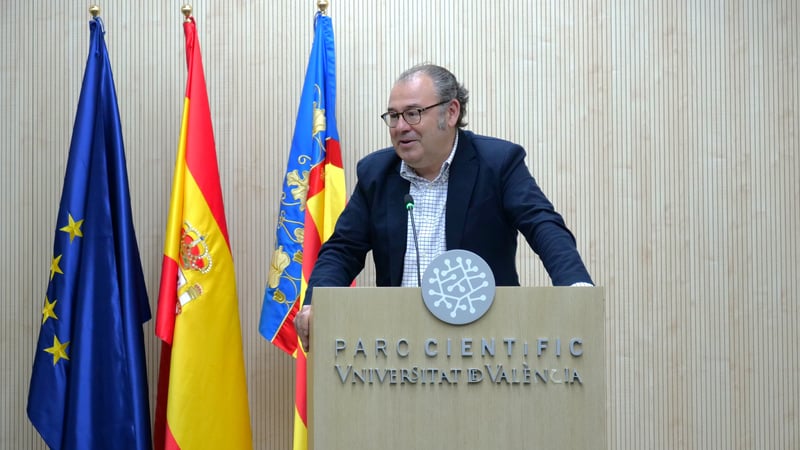 Guillermo Palao Moreno, professor of Private International Law UV during the closing ceremony of the IV Globaltech Conference. Photo: FPCUV
Guillermo Palao Moreno, professor of Private International Law UV during the closing ceremony of the IV Globaltech Conference. Photo: FPCUV
Closure
Guillermo Palao Moreno, UV Professor of Private International Law, closed the IV Globaltech Conference. "These conferences not only give rise to debate and dialogue", but he emphasized that "this is a format that will remain not only for its interest and the richness that has generated in all the discussions, but also the streaming that will remain and the ebook that we have been preparing of each of the sessions so that it remains not only audiovisually, but also in pdf with the reflections that have been poured by researchers, investors and PDI, that is, by all the staff who have gone through these sessions".
With the collaboration of:


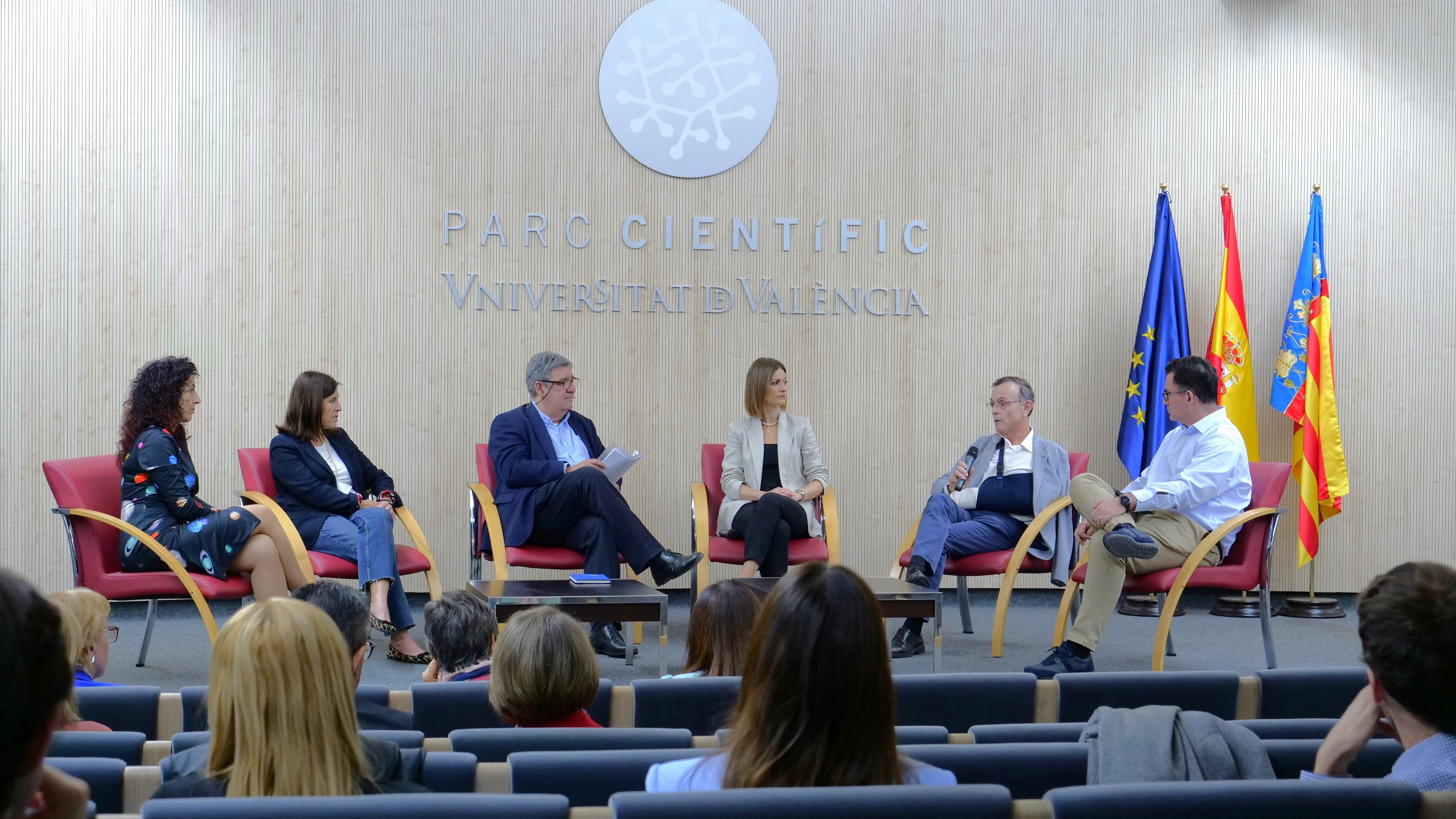

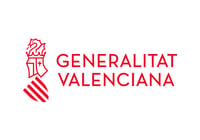
.jpg?width=200&height=55&name=912766_logo-UV-con-escudo-2-lineas%20(1).jpg)